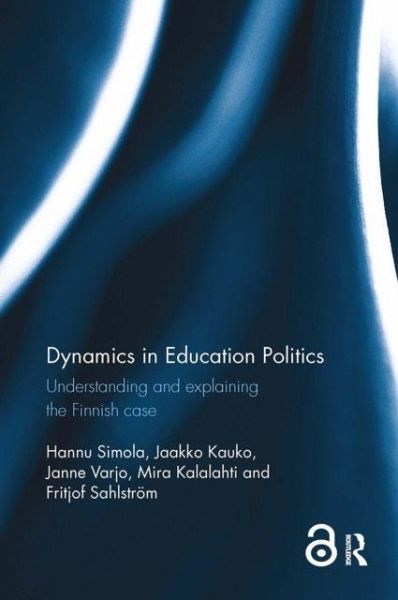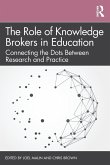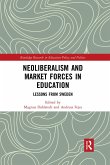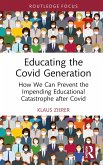Hannu Simola, Jaakko Kauko, Janne Varjo
Dynamics in Education Politics
Understanding and explaining the Finnish case
Hannu Simola, Jaakko Kauko, Janne Varjo
Dynamics in Education Politics
Understanding and explaining the Finnish case
- Broschiertes Buch
- Merkliste
- Auf die Merkliste
- Bewerten Bewerten
- Teilen
- Produkt teilen
- Produkterinnerung
- Produkterinnerung
In the field of comparative education without a strong theory-driven approach it is hard to go beyond merely listing the similarities and differences that make it possible to create countless rankings, but reveals little about specific and shared developmental processes between education systems. This book introduces a new theoretical framework
Andere Kunden interessierten sich auch für
![Education for Social Justice Education for Social Justice]() Nicholas M. MichelliEducation for Social Justice40,99 €
Nicholas M. MichelliEducation for Social Justice40,99 €![The Role of Knowledge Brokers in Education The Role of Knowledge Brokers in Education]() The Role of Knowledge Brokers in Education39,99 €
The Role of Knowledge Brokers in Education39,99 €![Neoliberalism and Market Forces in Education Neoliberalism and Market Forces in Education]() Neoliberalism and Market Forces in Education60,99 €
Neoliberalism and Market Forces in Education60,99 €![Teachers' Work During the Pandemic Teachers' Work During the Pandemic]() Nina Bascia (Canada University of Toronto)Teachers' Work During the Pandemic57,99 €
Nina Bascia (Canada University of Toronto)Teachers' Work During the Pandemic57,99 €![Educating the Covid Generation Educating the Covid Generation]() Klaus Zierer (Germany University of Augsburg)Educating the Covid Generation77,99 €
Klaus Zierer (Germany University of Augsburg)Educating the Covid Generation77,99 €![Teacher Education for Diversity Teacher Education for Diversity]() Teacher Education for Diversity58,99 €
Teacher Education for Diversity58,99 €![Ecological Principles for Sustainable Education Ecological Principles for Sustainable Education]() Liza Ireland (Canada Royal Roads University)Ecological Principles for Sustainable Education196,99 €
Liza Ireland (Canada Royal Roads University)Ecological Principles for Sustainable Education196,99 €-
-
-
In the field of comparative education without a strong theory-driven approach it is hard to go beyond merely listing the similarities and differences that make it possible to create countless rankings, but reveals little about specific and shared developmental processes between education systems. This book introduces a new theoretical framework
Hinweis: Dieser Artikel kann nur an eine deutsche Lieferadresse ausgeliefert werden.
Hinweis: Dieser Artikel kann nur an eine deutsche Lieferadresse ausgeliefert werden.
Produktdetails
- Produktdetails
- Verlag: Taylor & Francis Ltd
- Seitenzahl: 168
- Erscheinungstermin: 14. Oktober 2024
- Englisch
- Abmessung: 230mm x 153mm x 13mm
- Gewicht: 260g
- ISBN-13: 9781032929743
- ISBN-10: 103292974X
- Artikelnr.: 71710547
- Herstellerkennzeichnung
- Libri GmbH
- Europaallee 1
- 36244 Bad Hersfeld
- gpsr@libri.de
- Verlag: Taylor & Francis Ltd
- Seitenzahl: 168
- Erscheinungstermin: 14. Oktober 2024
- Englisch
- Abmessung: 230mm x 153mm x 13mm
- Gewicht: 260g
- ISBN-13: 9781032929743
- ISBN-10: 103292974X
- Artikelnr.: 71710547
- Herstellerkennzeichnung
- Libri GmbH
- Europaallee 1
- 36244 Bad Hersfeld
- gpsr@libri.de
Hannu Simola, PhD, is Professor in Sociology and Politics of Education, at the Universities of Turku and Helsinki, Finland. His research interests are currently focused on socioanalysis of teacherhood, contextual analytics of educational innovations and local educational ethos. His recent book is The Finnish Education Mystery (Routledge 2015). Jaakko Kauko, PhD, MSocSc, is Associate Professor in Education at the School of Education, University of Tampere, Finland. His research is situated in the fields of politics of education and comparative education. He is interested in the questions of power, contingency, and complexity. Janne Varjo, PhD, is Lecturer at the Institute of Behavioural Sciences, and more particularly within the Research Unit focusing on the Sociology and Politics of Education, at the University of Helsinki. His research interests include sociology of education, history of education and administration, economy and planning of education. Mira Kalalahti, DrSocSc, MA, is Post-doctoral Researcher in the Research Unit Focusing on the Sociology and Politics of Education at the Department of Teacher Education, University of Helsinki, Finland. Her research interests involve sociology of education, especially questions concerning the equality of educational opportunities and educational transitions. Fritjof Sahlström, PhD, is Professor in Education at Åbo Akademi University, Finland. His research has focused on the organization of interaction in educational settings, on developing ways of documenting and analysing classroom interaction relying on conversation analysis, and on the relationships between interaction, participation and social reproduction.
Acknowledgements
Introduction
1. Comparative Analytics in the Dynamics of Education Politics
1.1 Comparative education as a contested terrain
1.2 A proposal for a more systematic, flexible and vivid approach: CADEP
2. Orienting to the Finnish case
2.1 The history of political situations
2.2 The history of political possibilities
2.3 The history of politicking
3. Dynamics in Policymaking
3.1. Late but enduring structures reflecting a belief in schooling
3.2. Middle-class liberalist equity meets factory- and farmland-based
equality
3.3 Equality enhanced by the recession and PISA
3.4. Conclusion: buffering and embedded egalitarianism
4. Dynamics in governance
4.1 From strict centralisation towards NPM and decentralisation
4.2 Punctuated trust
4.3 Non-materialised QAE
4.4 Conclusion: redistributing but punctuated trust
5. Dynamics in family educational strategies
5.1. Leaving the Peruskoulu monolith behind
5.2. Contradictory school choice
5.3. Local politicking for soft school choice
5.4. Conclusion: reliable but diverged parenthood
6. Dynamics in classroom cultures
6.1. From Herbart-Zillerian and social pedagogy to Peruskoulu didactics
6.2. Individualised Peruskoulu pedagogies since 1970
6.3. A hybrid of tradition and progress
6.4 Conclusion: consolidating but paternalistic progressivism
7. The dynamics of Finnish basic-education politics: from understanding to
explanation
Introduction
1. Comparative Analytics in the Dynamics of Education Politics
1.1 Comparative education as a contested terrain
1.2 A proposal for a more systematic, flexible and vivid approach: CADEP
2. Orienting to the Finnish case
2.1 The history of political situations
2.2 The history of political possibilities
2.3 The history of politicking
3. Dynamics in Policymaking
3.1. Late but enduring structures reflecting a belief in schooling
3.2. Middle-class liberalist equity meets factory- and farmland-based
equality
3.3 Equality enhanced by the recession and PISA
3.4. Conclusion: buffering and embedded egalitarianism
4. Dynamics in governance
4.1 From strict centralisation towards NPM and decentralisation
4.2 Punctuated trust
4.3 Non-materialised QAE
4.4 Conclusion: redistributing but punctuated trust
5. Dynamics in family educational strategies
5.1. Leaving the Peruskoulu monolith behind
5.2. Contradictory school choice
5.3. Local politicking for soft school choice
5.4. Conclusion: reliable but diverged parenthood
6. Dynamics in classroom cultures
6.1. From Herbart-Zillerian and social pedagogy to Peruskoulu didactics
6.2. Individualised Peruskoulu pedagogies since 1970
6.3. A hybrid of tradition and progress
6.4 Conclusion: consolidating but paternalistic progressivism
7. The dynamics of Finnish basic-education politics: from understanding to
explanation
Acknowledgements
Introduction
1. Comparative Analytics in the Dynamics of Education Politics
1.1 Comparative education as a contested terrain
1.2 A proposal for a more systematic, flexible and vivid approach: CADEP
2. Orienting to the Finnish case
2.1 The history of political situations
2.2 The history of political possibilities
2.3 The history of politicking
3. Dynamics in Policymaking
3.1. Late but enduring structures reflecting a belief in schooling
3.2. Middle-class liberalist equity meets factory- and farmland-based
equality
3.3 Equality enhanced by the recession and PISA
3.4. Conclusion: buffering and embedded egalitarianism
4. Dynamics in governance
4.1 From strict centralisation towards NPM and decentralisation
4.2 Punctuated trust
4.3 Non-materialised QAE
4.4 Conclusion: redistributing but punctuated trust
5. Dynamics in family educational strategies
5.1. Leaving the Peruskoulu monolith behind
5.2. Contradictory school choice
5.3. Local politicking for soft school choice
5.4. Conclusion: reliable but diverged parenthood
6. Dynamics in classroom cultures
6.1. From Herbart-Zillerian and social pedagogy to Peruskoulu didactics
6.2. Individualised Peruskoulu pedagogies since 1970
6.3. A hybrid of tradition and progress
6.4 Conclusion: consolidating but paternalistic progressivism
7. The dynamics of Finnish basic-education politics: from understanding to
explanation
Introduction
1. Comparative Analytics in the Dynamics of Education Politics
1.1 Comparative education as a contested terrain
1.2 A proposal for a more systematic, flexible and vivid approach: CADEP
2. Orienting to the Finnish case
2.1 The history of political situations
2.2 The history of political possibilities
2.3 The history of politicking
3. Dynamics in Policymaking
3.1. Late but enduring structures reflecting a belief in schooling
3.2. Middle-class liberalist equity meets factory- and farmland-based
equality
3.3 Equality enhanced by the recession and PISA
3.4. Conclusion: buffering and embedded egalitarianism
4. Dynamics in governance
4.1 From strict centralisation towards NPM and decentralisation
4.2 Punctuated trust
4.3 Non-materialised QAE
4.4 Conclusion: redistributing but punctuated trust
5. Dynamics in family educational strategies
5.1. Leaving the Peruskoulu monolith behind
5.2. Contradictory school choice
5.3. Local politicking for soft school choice
5.4. Conclusion: reliable but diverged parenthood
6. Dynamics in classroom cultures
6.1. From Herbart-Zillerian and social pedagogy to Peruskoulu didactics
6.2. Individualised Peruskoulu pedagogies since 1970
6.3. A hybrid of tradition and progress
6.4 Conclusion: consolidating but paternalistic progressivism
7. The dynamics of Finnish basic-education politics: from understanding to
explanation








